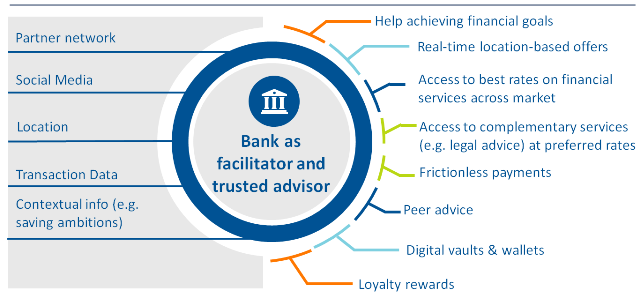
33% of millennials believe they won’t need a bank at all in 5 years. We think different…
Let’s make no mistake, the world of banking is changing fast. Changing customer behaviour – led by millennials – is a major factor. As is exponential technology change. But, while banking will be very different in 2020, we still think banks can be at the heart of it.
Customer in control
Before the banking crisis, you were statistically more likely to change spouse than to switch banking providers. But this is changing. The bank customer is increasingly in control.
As banking has moved online, it has become easier for consumers to compare banking products, banking experiences and get more transparency around pricing. And customers now have much more choice.
New competition
While making it easier for consumers to compare products, technology has also made it easier for new players – including many non-banks – to enter the market.
The increased use of digital channels has increased competition in the banking sector, new entrants don’t need a branch network – plus they can also reach a wider audience.
On top of it, cloud computing has lowered IT infrastructure costs, reducing start-up costs and the level of scale needed to be profitable.
And so many non-banks and fintech companies have begun offering banking services – companies such as Apple – and the classic universal banking model is being dismantled.
Changing expectations
Customer expectations are changing too, in part because of the level of experience consumers have grown used to from online retailers such as Amazon.
Millennials, in particular, are displaying very different behaviours than traditional banking consumers. Young and digitally savvy, they are much more likely to use new technologies for banking – more than 72% of Millennials are active users of mobile banking, while 92% are active users of social media.
And they are also much less loyal. For example, the likelihood of Millennials to use the same wealth manager as their ancestors is only around 10%. And they increasingly question the need for banks at all – with 33% of millennials believing they won’t need a bank at all by 2020.
A real threat…
This matters. By 2020, Millennials will make up more than 50% of the global workforce.
More generally, increasing competition could see banks lose significant revenue and margins – our partner Accenture estimates that up to 30% of banks’ revenues could be lost.
…But an opportunity as well
Banks still have plenty of competitive advantages – the trust established through hundreds of years safekeeping customers’ assets, access to customers’ transactional data, to name just two.
If banks can capitalize on these advantages, they have an opportunity to redefine themselves and their role in customers’ lives. Shifting the focus from customer account acquisition to customer experience…
Experience-driven banking
At Temenos, we refer to this opportunity as experience-driven banking.
We see digitization as an opportunity for banks to become more involved in customers’ commercial and financial lives. Banks should analyse customers’ transactional data, marry it with locational and contextual information to be able to deliver the right products and services, personalised to individual customers’ circumstances, at the right time and over the right channel.
Practically, this will mean becoming a trusted advisor to give customers expert advice, find ways for them to save money and proactively recommend products and services they actually need.

What is needed
Change is needed. Part of this change will be cultural. Banks must move from being data custodians to become data analysers, serving up the insights to improve customer outcomes. They must realize that the route to success lies in cannabilizing their business, opening it up to financial and non-finance partners, in order to retain a direct customer relationship.
But the challenge is also technological. Banks will need some critical software components. For example, banks will clearly need to invest in the analytical capabilities to gain insight into customers’ lives and make targeted recommendations.
What is often overlooked is the importance of modernizing legacy. So much of bank data is still not real time – it is split across multiple systems and organised around products not customers. It will be impossible in these old systems to generate the right levels of analysis. Also, simplifying and automating processes will be essential to deliver the level of instant fulfilment needed in a digital environment.
A race against time
Delivering experience-driven banking is a race against time. Banks have access to customers’ transactional data. But big technology companies such as Google and Apple have a deeper reach into customers’ lives and increasingly control customer touchpoints. And, through initiatives like Apple Pay as well regulations like PSD II, they are fast building data on customers’ financial transactions.
So banks must accelerate their digital programmes, starting with replacing core systems
It won’t be millennials or fintech start-ups that kill banks, it will be a failure to address legacy IT.